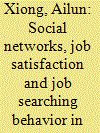| Srl | Item |
| 1 |
ID:
154448


|
|
|
|
|
| Summary/Abstract |
The impact of social capital on economic development has been broadly studied by scholars. However, research in the Chinese context is relatively rare. Drawing upon data from the China General Social Survey, our results suggest that the enhancing effect of social capital on total factor productivity is very limited in the case of China. The network dimension of social capital is significant only in pooled OLS estimations, and trust as well as the participation dimension of social capital exert no impact across all estimations. Our interpretation is that this is partly due to the fact that trust, values and norms formed in civil society are inherently difficult to transmit to the market sector. Besides, the impact of social capital on economic performance is undermined when physical capital plays a significant role in production. We therefore propose that the effect of social capital on economic performance is contingent on localized social and economic conditions.
|
|
|
|
|
|
|
|
|
|
|
|
|
|
|
|
| 2 |
ID:
159028


|
|
|
|
|
| Summary/Abstract |
This study first investigates determinants of job searching strategies and then examines if social networks are connected with better job outcomes. Unlike previous studies that focus solely on income, this paper pays more heed to job satisfaction. Based on data drawn from China General Social Survey, we find that disadvantaged job seekers rely primarily on informal channels; whereas experienced and better-educated job seekers tend to search for jobs through formal channels. However, those reaping the largest benefit from using networks are the job seekers who are able to use formal and informal channels jointly. By disaggregating the whole sample, we further find that the promoting effect of network use is contingent on factors such as gender and types of jobs. Network use brings about larger benefits to female and job seekers target to prestigious occupations. Finally, it appears that whether a job seeker can receive influential help depends primarily on the social status of the contacts rather than their tie strength. The results of our paper thus urge us to examine the combination of different searching strategies rather than studying them separately.
|
|
|
|
|
|
|
|
|
|
|
|
|
|
|
|